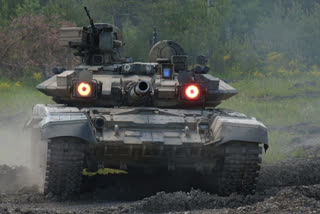New Delhi:The Ministry of Defence recently appointed KPMG Advisory Services Pvt Ltd along with Khaitan and Co Ltd as Consultancy Agencies for the initiative to corporatize Ordnance Factory Board (OFB). Discussion over public and private roles in the Defence Industrial Base (DIB) has been a matter of debate these days. One topic on which a lot of opinions have been expressed is the corporatization of OFB. Most view it as a plug and play initiative with immediate returns.
The question of public and private sector roles in the area of national security has been a sensitive issue in most countries. It is seen that increased private sector participation came in developed economies mostly after the end of the Cold War, as a result of large scale downsizing of militaries and shrinking demands for weapons. In India, the security landscape is exactly the opposite with eyeball to eyeball confrontation having spread to LAC. Efforts to optimize the DIB though extremely necessary from the cost efficiency angle needs to be progressed with adequate caution, so as to minimize organizational entropy and disruption that could follow.
Sometime back the MOD had appointed PricewaterhouseCoopers (PwC) as a consultant to provide the strategic direction and implementation plan for the GOCO initiative at Army Base Workshops (ABW), which provide MRO support to Army`s weapons and equipment. One issue which stood out was the single-minded approach of the Army to hand over control of core rebuild operations to private operators. This appeared to be a non-negotiable term of reference. Leaders not used to interdisciplinary collaboration, took a myopic view to somehow implement GOCO. The detailed project report is at best an amateur effort for the price paid. It has overlooked the fact that ABWs are engineering fortresses with a corpus of pragmatic know-how so essential for mission readiness of an obsolescent inventory--- a unique medley of technologies procured from all corners of the world.
That three-decade-old Bofors continue to be the principal firepower provider at the LC/ LAC, is courtesy this knowledge cache. Making tracks move and guns blaze in super high altitudes requires a lot of painstaking efforts from the maintainers. A more accommodative world view, taking into account the long term security threats to the country; lessons learnt by countries like USA and UK during the Gulf war, who jettisoned GOCO for a balanced Public-Private Partnership (hybridization) to achieve a high state of mission readiness, surge capability and operational effectiveness, was needed. Thankfully the standoff at the LAC has restored the significance of conventional readiness and one hopes that the Army looks before it leaps for contractor-operated MRO, instead of having direct authority over ABWs. A contractual relationship can sabotage operational readiness.
Ordnance Factories(OFs) have over the years provided the armed forces with weapons and equipment which were either developed by DRDO or where TOT had been obtained from abroad. The armed forces have been raising genuine concerns about quality, costs and time schedules in respect of products of OFs. There certainly exists a need to modernize, introduce industrial best practices like lean staffing, just in time inventory, etc. However, some unique advantage the OFs offered have been overlooked-- the capability to scale up deliveries in times of crisis; the practice of instantly providing maintainers with subsystems needed to shore up mission readiness of systems deployed in the field. Similar practices were adopted by most developed nations till the end of the Cold War.
With the prospect of a two-front war which the CDS has been alluding to, it is extremely important that this consultancy is undertaken with a singular aim i.e. to provide to the gallant Indian soldier, ultra-reliable assault rifles, tanks, guns which continue to function till the last round, on those icy mountain tops, without stoppages. The consultancy needs to be done in concert with OFB in an atmosphere of openness and not without them-- unlike the `Us vs Them’ stance adopted by PwC for GOCO. It needs to be remembered that long-lasting changes in organizations take place when the spotlight is on people. Alongsideemphasis on results and accountability, there has to beconcern about employees well being, workand life balance. Technology is not the challenge, culture is. Cultures could be collaborative, innovative, high performing, trusting or transparent. Otherwise, there are strong chances of this effort getting into a tailspin, resulting in half baked implementation and disruption. The MOD has under it several DPSUs which are corporatized yet face similar problems of quality, cost and time overruns with hardly any innovation of consequence. Innovation in defence greatly helped the Allied Forces to convincingly defeat the Germans during WW II and could provide our armed forces, the operational overreach to win a two-front war.
If the Prime Minister`s call for self-reliance has to be made a reality, the DIB has to spearhead the same. OFs and DPSUs are the cornerstones of local DIB, having the knowledge base to take up development of weapon systems post COVID. They cannot remain a place for low-level assembly, build to print and component manufacturing efforts and need to move into the domain of high wage research and innovation-based industrial entities whose creativity not only secures Mother India but also provides spin-offs in civilian fields. This calls for a strong emphasis on core competencies and hybridization ofmanufacture at OFs with intensesubsystemlevel collaboration withthe private sector. Weapon systems incorporate a host of technologies that combine together to produce a military effect. To emerge as a net innovator and exporter of weapon systems, India has to focus on the development of such technologies. The corporatization of OFB should focus more on effectiveness than costs to achieve the PM`s vision.
Article by Lt Gen (Dr) N B Singh, former DGEME, DGIS and Member - Armed Forces Tribunal
*The opinions expressed above are the personal views of the author and do not reflect the views of ETV Bharat
